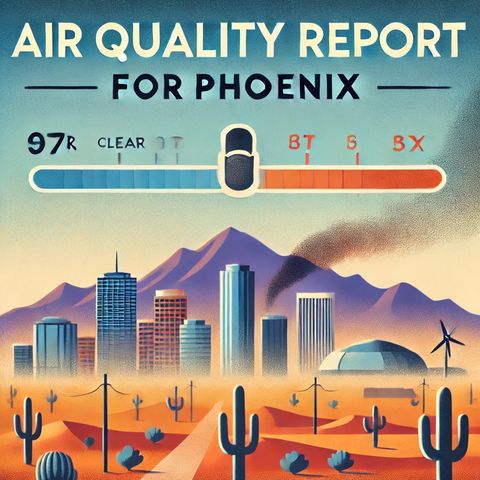Moderate Air Quality in Phoenix, Concerns Persist Amid Pollution Challenges

Descarga y escucha en cualquier lugar
Descarga tus episodios favoritos y disfrútalos, ¡dondequiera que estés! Regístrate o inicia sesión ahora para acceder a la escucha sin conexión.
Moderate Air Quality in Phoenix, Concerns Persist Amid Pollution Challenges
Esta transcripción es generada automáticamente. Ten en cuenta que no se garantiza una precisión absoluta.
Descripción
As of today, the air quality in Phoenix, Arizona, is a topic of significant interest and importance for residents and visitors alike. Phoenix, known for its sprawling metropolitan area and...
mostra másToday, the AQI for Phoenix shows moderate levels of air pollution. This means that the air quality is generally acceptable; however, there may be some health concerns for a very small number of individuals who are particularly sensitive to air pollution. The primary contributors to the air quality levels in the city today include particulate matter, especially PM2.5 and PM10, and ground-level ozone.
Particulate matter, or PM, consists of tiny particles in the air that can penetrate the respiratory system and affect lung function. PM2.5 particles are those with a diameter of 2.5 micrometers or smaller and are particularly significant because they can reach deep into the lungs and even enter the bloodstream. On days when PM levels are elevated, individuals with respiratory conditions, such as asthma, may experience symptoms.
Ground-level ozone is another major component of air pollution in Phoenix. It forms when pollutants emitted by cars, power plants, and industrial sources react in the presence of sunlight. Given Phoenix's sunny climate, ozone formation can be a persistent issue. High ozone levels can lead to respiratory problems and exacerbate conditions like asthma.
Several factors influence the air quality in Phoenix. The city's rapid growth and increased vehicle traffic contribute significantly to emissions. Additionally, Phoenix's geographical location in the Valley of the Sun means that it is prone to temperature inversions, where a layer of cooler air is trapped near the ground by a layer of warmer air above, preventing pollutants from dispersing.
To mitigate these air quality issues, local authorities encourage residents to reduce emissions by using public transportation, carpooling, or adopting cleaner technologies such as electric vehicles. On days with poor air quality, it is advisable for vulnerable groups, including children, the elderly, and those with respiratory problems, to limit outdoor activities.
Efforts are also underway to improve air quality through regulatory measures and by promoting sustainable urban development. Projects focused on increasing green spaces, enhancing public transit, and implementing stricter emissions standards are part of a long-term strategy to improve the air quality in Phoenix.
In conclusion, while today's air quality in Phoenix is moderate, it is essential to remain informed about current conditions and heed advice from health and environmental agencies. By staying aware and taking proactive steps, residents and visitors can protect their health and contribute to a cleaner, healthier environment.
Información
| Autor | QP-5 |
| Organización | William Corbin |
| Página web | - |
| Etiquetas |
Copyright 2024 - Spreaker Inc. an iHeartMedia Company
